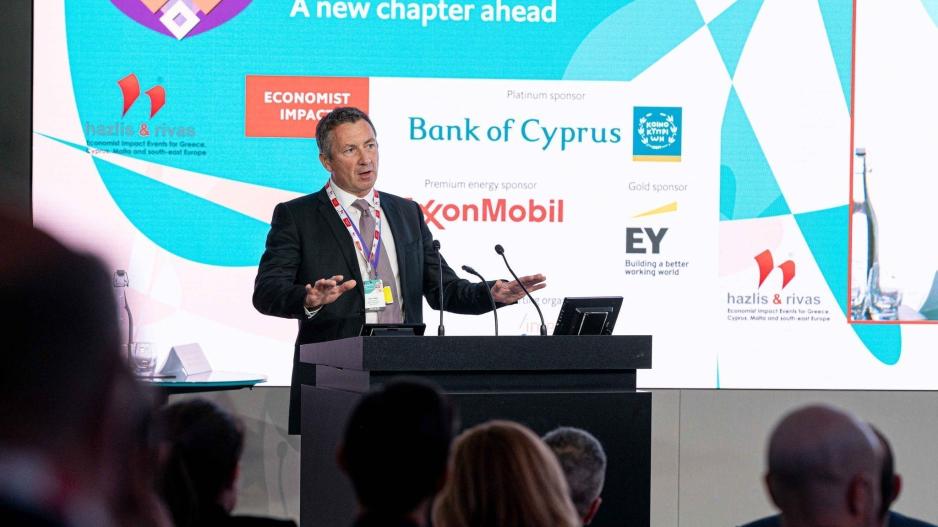The Role of Natural Gas in Cyprus' Long-Term Economic Plan and Exxon Mobil’s Commitment to the Region
“The natural gas utilization project in the Cypriot EEZ is a key part of our broader long-term plan for a sustainable economy”, the Energy Minister George Papanastasiou explained at “The Cyprus Investment Summit”, which took place in London and was organized by the Economist.
He stated that the study of options for natural gas pipelines is currently underway based on a sustainability report. "This is why we need investors," said the Minister, addressing the audience at the conference.
During his brief speech and the subsequent discussion, he emphasized that it is not realistic to consider Cyprus as an energy hub, like Egypt or Israel, given the current circumstances and the lack of necessary infrastructure. He pointed out that a hub is not defined by the location of reserves but by its infrastructure. However, he noted that Cyprus can become an energy supplier to Europe.
When asked about Cyprus’ approach to Turkey regarding energy, Mr. Papastasiou responded that the government aims to provide "attractive" solutions in the natural gas utilization sector that would facilitate the exploitation of energy resources as a means to solve the long due political problem. He added that the government does not hinder energy utilization as a tool to create a fertile ground for both countries to sit down and find a solution. He further emphasized that Cyprus's natural wealth belongs to all communities on the island and that the government wants it to be utilized in a way that contributes to the resolution of the Cyprus issue.
Mr. Papastasiou also mentioned the prospect of connecting an upgraded electricity network in Cyprus to those of other countries, especially Greece, which would mean integration with Europe's energy network. He also highlighted the potential for wider utilization of solar energy, which requires storage solutions for the generated energy.
Moreover, the Minister mentioned that Cyprus possesses the necessary human capital but lacks the technical professional positions required to retain these individuals on the island. Through the energy strategy, he added, efforts are being made to create such job opportunities. "This government thinks differently and will do things differently," he noted.
The Economist conference, held annually at the London Stock Exchange building, covered many aspects of the economic and investment environment and the prospects Cyprus offers to interested investors.

ExxonMobil's Vice President, Mr. John Ardill, participated in the panel discussion with the Minister of Energy. He pointed out that Cyprus is not the only "geopolitically complex" region in which his company operates. He assured that they have "grand plans" and are fully committed to Cyprus, aiming for economic growth and prosperity. He emphasized the significance of the broader region for ExxonMobil.
Mr. Ardill also mentioned that infrastructure decisions depend on a detailed understanding of gas quantities in each area and involve technical details, commercial decisions, and geopolitical considerations.
The negotiator Menelaos Menelaou expressed the position of the Cypriot government in the pursuit of a solution in accordance with international law. He emphasized that Cyprus does not act as passively to its national problem in foreign policy but rather as an active player with multilateral regional collaborations.
Presenting the government's new economic strategy, Chris Patsalidis, the special advisor to the President on economic policy, referred to positive economic indicators, such as one of the highest growth rates and one of the lowest inflation rates in the EU, as well as low public and private debt.
Eugene Eugenides, the President of Invest Cyprus, spoke about a "highly targeted national strategy" to attract high-skilled businesses and talent, which has so far led to the creation of a technological hub.
Panicos Nicolaou, the CEO of the Bank of Cyprus, emphasized the importance placed on the stability of the financial sector from his institution's perspective.
Among other speakers, Stelios Dimitriou from EY Cyprus presented a survey of attractiveness that highlighted the sectors of financial services, healthcare, real estate, information technology, energy, renewable energy sources, education, and hospitality as the most interesting for investors.
Speaking to Cyprus News Agency, Mr. Papanastasiou said that the conference was an opportunity for the Ministry to present its energy plans. "It is a conference that attracts the attention of many investors. In this case, we presented the plan regarding energy, which concerns Cyprus' EEZ (Exclusive Economic Zone) as well as the connection of this EEZ with infrastructure and the possibility of these infrastructures being linked to the European market, which is in need of liquefied natural gas," he explained.






